Whether you’re trying for the first time or you’ve been through it before, the road to conception can be full of twists, turns…and so many questions. For example: “How do I find my ‘fertile window?’ Or, “when is the right time to see a fertility specialist?” Just like our bodies, our fertility journeys are unique—so it’s only natural to wonder whether you’re doing everything “right” to conceive a healthy pregnancy, especially if it’s taking a little longer than anticipated.
As far as questions around baby-making go, Dr. Andy Huang, M.D., has fielded them all—the reproductive endocrinologist and fertility specialist has helped such big names as the Kardashians and Chrissy Teigen on their roads to conception, and has built his practice on navigating reproductive challenges.
Below, Dr. Huang answers some of the most common queries around preconception, infertility, and more.

So many women have heard that they should go off of birth control early to give enough time for their bodies to adjust in order to get pregnant. Is that true? What role does birth control have on fertility?
“No, that’s an old wive’s tale. Birth control pills these days are very low-dose and they’re very reversible. By stopping hormonal birth control, a woman should be able to get pregnant very easily and it doesn’t matter if she’s been on two weeks of birth control or ten years. The problem with hormonal contraception is that sometimes it can mask the real issue for someone who’s low-reserve. So let’s say it’s someone who is 42 years old, and they’re going through menopause early—if you’re on birth control pills, it can be hard to know. They might not know that their periods are going away if they’re on birth control pills. The birth control pills are masking that their ovarian reserve is low.”
Should women be tracking their ovulation on their own?
“Definitely, it’s one of the easier things to do. And if they track on their own and they think that they’re not ovulating consistently then they should see a fertility specialist sooner. If a woman has a period every 28 days and she’s tracking it and everything is appropriate, great. But if a woman has irregular periods and she’s not ovulating, don’t wait 12 months to see a fertility specialist because ovulation is clearly an issue. So it’s a great idea to track your menstrual cycle and ovulation on your own and it’s a simple thing to do. You can buy an over-the-counter ovulation kit and just utilize that with calendaring to optimize timing.”
If someone is unsuccessfully trying to conceive, at what point should they see a fertility specialist?
”That depends on age. Usually, infertility is diagnosed after 12 months of trying to get pregnant and not having any success. But over 35 years old, we shorten that time and say six months. Eighty-five percent of the time you should be pregnant within a year of trying. So if you’re not pregnant within the year, you’re in that 15 percent, which is one in every eight couples.”
Let us personalize your vitamin
routine in 60 seconds.

What are your
stage-specific needs?
What can someone expect from a fertility test?
“First, we get an initial history to find out any clues that may tell why the couple is not getting pregnant. Immediately after that, we will do a physical, which consists of four major tests. One is a semen analysis to assess the male factor. The second test is an ultrasound that may be accompanied with blood tests and hormone panels to assess your ovarian reserve. The ovarian reserve is used to evaluate how young a woman’s ovaries are. The third test we do is to evaluate ovulation or how well a woman is ovulating. That can be done by ultrasound in combination with blood tests. And then the last test we use is called a Hysterosalpingogram (HSG), which looks at your anatomy. We’re looking at anatomical factors like a woman’s uterus and fallopian tubes. That’s the panel of the four elements that we will want to assess.”
Once you make an assessment on what the issue is, what do treatment options look like from there?
“The first step is assessment, where we figure out why. After assessment, we make a diagnosis. And then once you get the diagnosis, we go into treatment. So if it’s a sperm problem, depending on the severity, we will go into either IUI or IVF. If it’s an anatomy issue, we usually look to surgery to fix it. Or, if the tubes are blocked, we go straight to IVF. If it’s an ovulation disorder, then we try to induce ovulation using medication. And if it’s an ovarian reserve problem, meaning the ovaries are the issue, then sometimes we’ll do ovarian stimulation or IVF.”
What role does stress play in fertility?
“What you put into the body is what you get out of the body. And stress can negatively affect the body because it’s all connected. The most immediate effect we see is that stress can put you in a fight or flight response. When your body is in a fight or flight response, it’s not going to want to get pregnant. The most extreme example is that when you are overly stressed, sometimes you stop having your period—and when you stop having your period that’s because you don’t ovulate anymore. So stress can definitely affect ovulation.”
Sign up to receive doctor-backed, stage-specific content in your inbox each week.
theFolio in Your Inbox
How can someone increase their fertility at home?
“The simplest thing you can do is focus on a healthy lifestyle. That means eating a balanced diet, moderate exercise, and avoiding processed foods, tobacco—cutting back on drinking alcohol and excessive caffeine—as these are all things that affect fertility, sperm, and egg quality. Foods rich in antioxidants and vitamin C may actually improve sperm count and egg qualities as well, like berries.
“I always recommend supplements to my patients as well. Always. That’s because it’s one of the simplest things you can do, and can help give both men and women the best possible outcome. When patients come in, we have a whole list of supplements—but Perelel gives us the opportunity for us to be very specific in terms of what stage a woman is in her pregnancy, because the requirements are not always the same.”
Shop the Article:
- Clinically-Proven

Conception Support Pack*
$49.95
/ Month
- Prenatal for those trying to get pregnant
- Supports fertility and egg health*

Men’s Multi Support Pack
$42.70
/ Month
- May help support sperm health*
- Supports overall health, immunity and energy*

Baby Making Duo
$92.65
/ Month
Our Conception Support Pack was specifically formulated to support your fertility journey and reproductive health with nutrients that help prep your body for pregnancy—including our core prenatal vitamin, additional folate (the more bioavailable form of folic acid), omegas, and antioxidant support. And don’t forget that baby-making is 50/50: Our Men’s Multi Support Pack was created to support his overall health and fertility.
1 Fast facts - RESOLVE: The national infertility association. Resolve.org.
2 Rooney KL, Domar AD. The relationship between stress and infertility. Dialogues Clin Neurosci. 2018;20(1):41-47.
2 Uclahealth.org.
This article is for informational purposes only. It is not, nor is it intended to be, a substitute for professional medical advice, diagnosis, or treatment and we recommend that you always consult with your healthcare provider. To the extent that this article features the advice of physicians or medical practitioners, the views expressed are the views of the cited expert and do not necessarily represent the views of Perelel.


















